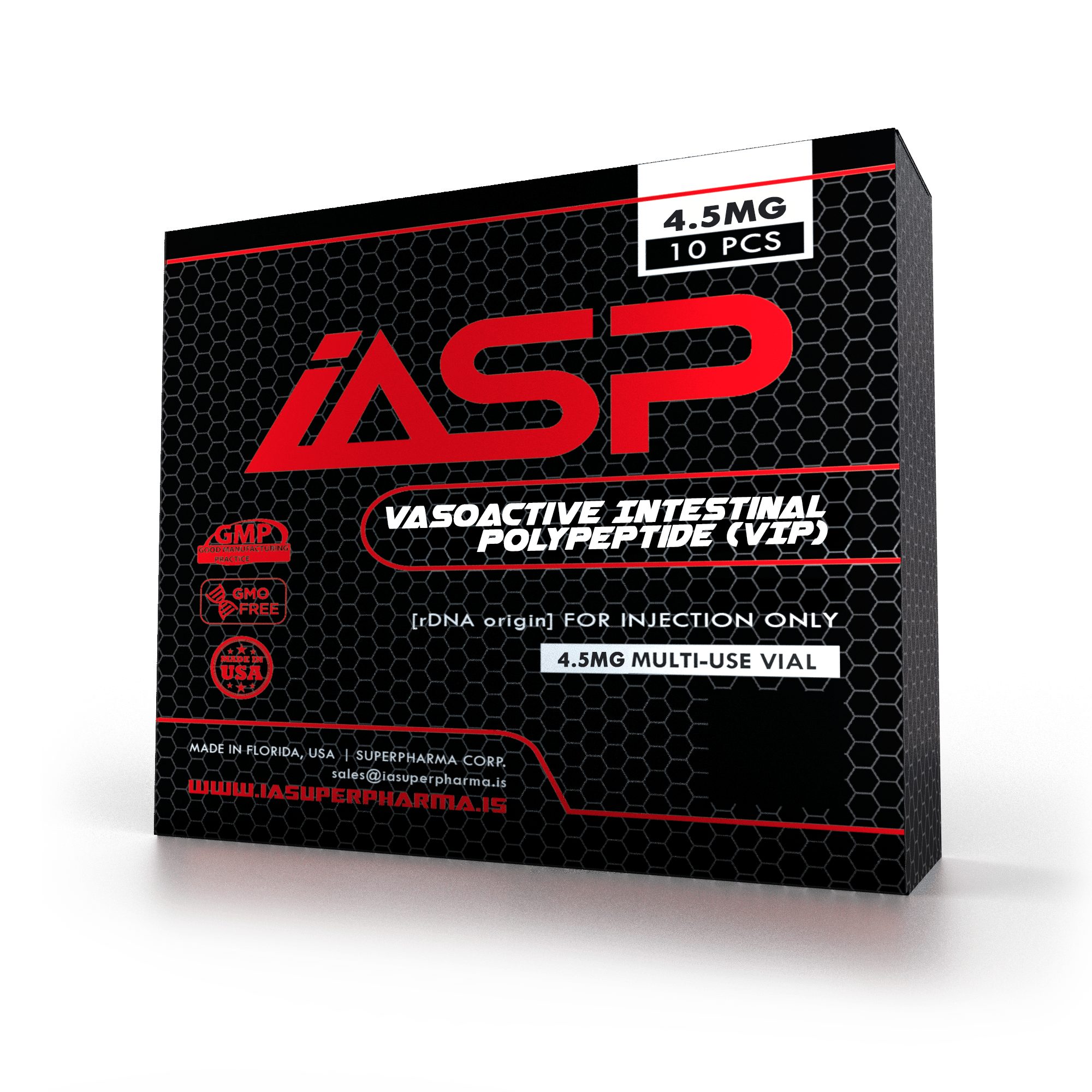This product is a box of 10 vials.
What Is Vasoactive Intestinal Polypeptide ?
What is VIP?
Vasoactive Intestinal Peptide (VIP) is a short peptide hormone produced in the gut, pancreas, and brain of humans and other vertebrates. It binds to specific receptors in the body and has many important functions, such as:
- Breaking down glycogen (a form of stored energy) in the liver and muscles.
- Lowering blood pressure.
- Relaxing smooth muscles in the digestive system.
- Increasing heart rate and the strength of heart contractions.
- Promoting water secretion in the digestive tract.
- Supporting vaginal lubrication.
- Regulating prolactin hormone release.
- Protecting cartilage and neurons from damage due to lack of oxygen or stress.
- Helping control the body's internal clock by syncing brain cells with light cues.
Amino Acid Sequence: HSDAVFTDNYXRLRKQMAVKKYLNSXLN
Molecular Formula: C147H237N43O43S
Molecular Weight:
Human Gene: VIP; 6q25.2
PubChem CID: 44567960
CAS Number: 37221-79-7
Synonyms: VIP, PHM27, Vasoactive intestinal polypeptide
VIP’s Role in Reducing Inflammation and Fibrosis
Research shows that VIP is highly effective at reducing inflammation and fibrosis (scarring) in various organs. This is especially important for conditions like neurodegenerative diseases (e.g., Alzheimer’s, Parkinson’s), pulmonary fibrosis (lung scarring), inflammatory bowel diseases (e.g., Crohn’s disease, ulcerative colitis), and cardiac fibrosis (heart scarring). By calming inflammation, VIP may help prevent or reduce the damage caused by these conditions, which often lead to serious health issues or death.
VIP and Inflammatory Bowel Diseases (IBDs)
In diseases like Crohn’s and ulcerative colitis, VIP helps strengthen the intestinal barrier, which prevents harmful substances from triggering inflammation. It also promotes the production of T cells that release interleukin-10, a molecule that reduces inflammation. This is key because a weak intestinal barrier can allow harmful particles to interact with immune cells, leading to worsening inflammation and disease.
VIP and Lung Health
VIP supports lung health in two main ways:
- Reducing Inflammation and Scarring: VIP suppresses a molecule called NFAT, which activates immune cells and causes inflammation. By controlling this process, VIP may prevent lung scarring (pulmonary fibrosis), a serious condition seen in diseases like COPD or sarcoidosis, which often requires a lung transplant.
- Improving Blood Flow and Muscle Growth: VIP relaxes blood vessels in the lungs, lowering blood pressure in the pulmonary artery and improving heart and lung function. It also slows the overgrowth of smooth muscle in the lungs, which is a problem in chronic asthma.
VIP and Organ Transplants
One major challenge with organ transplants is the body’s immune system attacking the new organ, leading to rejection. Current drugs to prevent rejection can weaken the immune system, increasing infection risk and causing side effects like scarring. VIP may offer a better solution by calming specific immune cells (dendritic cells) that trigger rejection, while still allowing the immune system to fight infections. This could make VIP a promising future treatment for transplant patients.
VIP as a Brain Protector
VIP plays three key roles in the brain:
- Acting as a Neurotransmitter: It helps brain cells communicate.
- Supporting Brain Growth: It promotes the development and repair of brain cells.
- Reducing Inflammation: It protects the brain from damage.
VIP helps maintain the blood-brain barrier, which controls what enters the brain and protects it from harmful substances. This is critical in conditions like multiple sclerosis or stroke. In Alzheimer’s disease, VIP may reduce harmful beta-amyloid buildup, and in Parkinson’s, it shifts the immune response to reduce inflammation. VIP also protects developing brains by preventing damage to white matter and supporting healthy neuron growth.
VIP and Heart Health
Cardiac fibrosis (heart scarring) is a common result of heart conditions and can lead to problems like valve issues, weaker heart contractions, or irregular heartbeats. While some drugs can slow this scarring, VIP may go further by not only slowing it but potentially reversing it. This effect is linked to VIP reducing levels of molecules (like angiotensin) that contribute to heart scarring.
VIP and COVID-19
A synthetic version of VIP, called aviptadil (RLF-100), shows promise in treating severe COVID-19 cases. It protects lung cells responsible for oxygen exchange and may block the SARS-CoV-2 virus from infecting them. Early studies suggest aviptadil helps patients on ventilators recover quickly, even those with serious health conditions. Ongoing clinical trials are testing its effectiveness further.
Why VIP Matters
VIP’s ability to reduce inflammation, prevent scarring, and protect organs like the brain, lungs, heart, and gut makes it a promising focus for medical research. Its potential in treating conditions like Alzheimer’s, lung diseases, heart conditions, and even COVID-19 highlights its importance. As research continues, VIP or similar compounds could lead to new treatments that improve health and save lives.
Curious about Vasoactive Intestinal Polypeptide (VIP)?
Join our Facebook group to engage directly with thousands of others who use this product, and follow our Facebook/IG pages for hot updates and product announcements!


